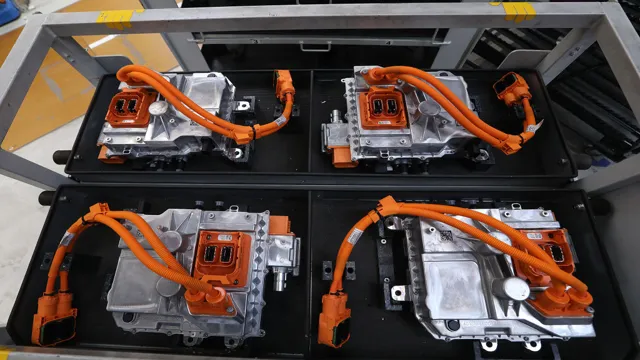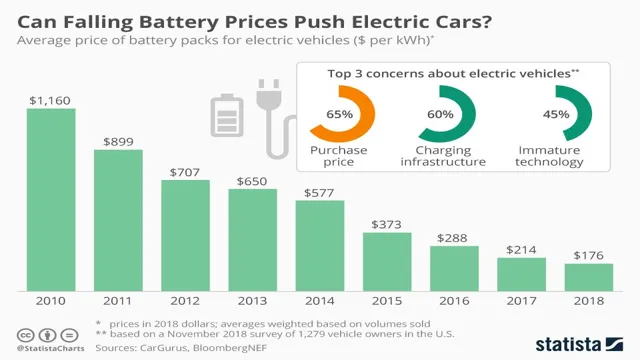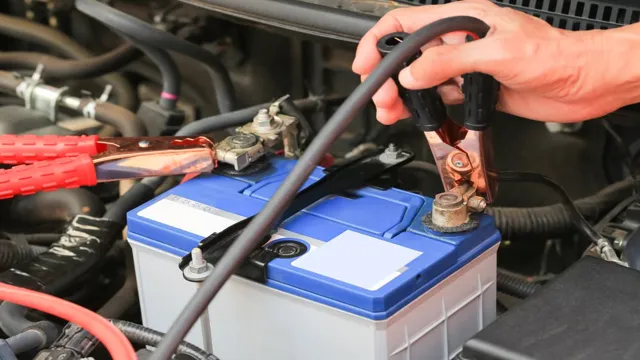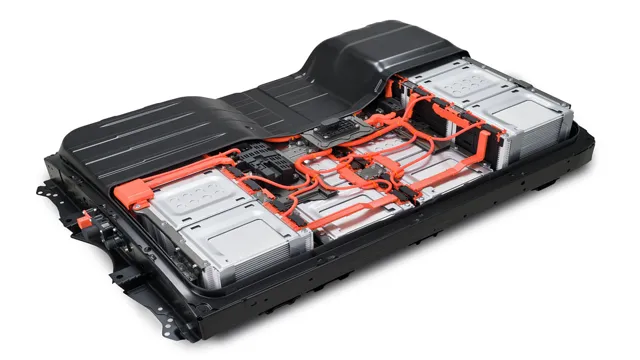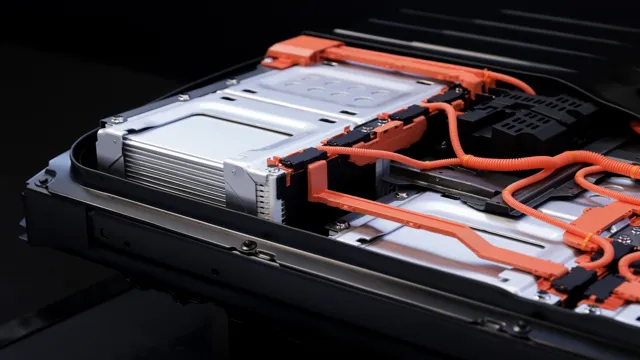The Ultimate Guide to Electric Car Batteries: Definition, Types and Benefits
Electric car batteries are becoming increasingly popular as we strive towards a greener future. However, many people are still uncertain about what exactly they are and how they work. In simple terms, electric car batteries are rechargeable batteries used to power electric vehicles.
They store the energy required to operate the electric motor, which in turn propels the vehicle. Electric car batteries are made up of a series of cells that convert chemical energy into electrical energy. These cells are usually made up of lithium-ion, the same type of battery found in smartphones and laptops.
However, electric car batteries are much larger and more complex than those found in consumer electronics. They require a special management system to regulate their charging and discharging to ensure their longevity and safety. When it comes to choosing an electric car, the battery is an incredibly important factor to consider.
The battery determines the car’s range, charging time, and overall performance. As such, many manufacturers are investing heavily in improving battery technology to make electric cars more accessible and attractive to the masses. Overall, electric car batteries are a key component of electric vehicles and will play a significant role in shaping the future of transportation.
As technology advances, we can expect to see even more efficient and powerful batteries that will help us transition away from fossil fuels and towards a more sustainable future.
What are Electric Car Batteries?
An electric car battery refers to the rechargeable device in an electric vehicle that stores and supplies electrical energy to power the electric motor. Electric car batteries are typically composed of thousands of lithium-ion cells arranged in modules or packs. These cells operate by storing and releasing energy through the exchange of electrons between a positive and negative electrode.
Electric vehicle batteries, while similar to the batteries used in consumer electronics and hybrid vehicles, are much larger and capable of storing significantly more energy. The capacity of an electric car battery is measured in kilowatt-hours (kWh) and can greatly affect the range and performance of the electric vehicle. As electric vehicles continue to gain popularity, advancements in electric car battery technology are being made to improve efficiency, reduce costs, and increase driving range.
Chemical Composition
Electric car batteries are the power source of electric vehicles, enabling them to move without needing a gas engine. These batteries are made up of several chemical components, including lithium-ion, nickel-metal hydride, and lead-acid. The lithium-ion battery is the most commonly used and the most efficient, with a higher energy density and longer lifespan compared to nickel-metal hydride and lead-acid batteries.
The battery cells are arranged in series to form battery packs that can provide the necessary voltage and amperage required for the electric motor to work. The chemistry of these batteries is fascinating, and they are changing the landscape of the automotive industry by offering a greener and more sustainable mode of transportation.
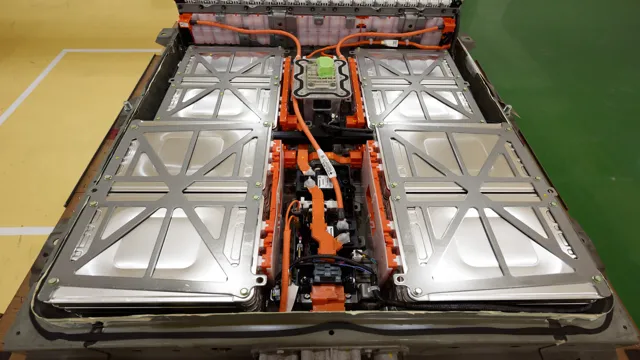
Types of Electric Car Batteries
Electric car batteries are rechargeable batteries that power an electric motor to propel the vehicle. They are an integral part of the electric car and play a crucial role in determining the range, performance, and charging time of the vehicle. Electric car batteries come in different types, each with its advantages and disadvantages.
Lithium-ion batteries are the most prevalent type of battery used in electric cars today due to their high energy density, fast charging, long lifespan, and low self-discharge rate. Other types of batteries used in electric cars include nickel-metal hydride (NiMH) batteries, which are more affordable but have lower energy density and lifespan, and solid-state batteries, which are still in the developmental stage but promise higher energy density and faster charging times. Electric car batteries are a significant factor in the cost of electric cars, but as the technology improves and manufacturing scales up, prices are gradually decreasing, making them more accessible to a broader range of consumers.
How Do Electric Car Batteries Work?
Electric car battery definition refers to a rechargeable battery used in electric vehicles for propulsion. These batteries typically use a chemical reaction to produce electricity, with lithium-ion batteries being the most common type used in modern electric cars. The batteries consist of a series of cells that store energy in the form of chemical reactions.
When the car is in motion, the stored energy is converted into electrical energy, which powers the electric motor that drives the car. The batteries can be charged using various charging systems, such as home charging stations, public charging stations, and rapid chargers. As electric cars become increasingly popular, the development of battery technology is becoming more important to ensure longer ranges and shorter charging times, making them a more viable alternative to gas-powered vehicles.
With more advancements in battery technology on the horizon, the future of electric cars looks promising.
Charging and Discharging
Electric car batteries work through a series of processes known as charging and discharging. To charge an electric car battery, an external power source is needed, which supplies electricity to the battery. The electric current from the power source is converted into chemical energy in the battery, which is then stored for later use.
When the electric car is being driven, the process is reversed, and the chemical energy in the battery is converted back into electrical energy, which powers the motor of the car. This process is known as discharging. As the car battery is used and discharged, the stored chemical energy is depleted, and the battery needs to be recharged again.
The charging and discharging process of an electric car battery is a continuous cycle that provides power to the car and propels it forward. So, the next time you are driving your electric car, remember that the battery is working hard, exchanging power back and forth, and keeping you on the move.
Range and Capacity
Electric car batteries are an innovative and exciting development in the automotive industry. Unlike traditional combustion engines, electric car batteries rely on chemical reactions to store and provide power. This means that the range and capacity of an electric car battery is determined by the amount of energy stored in its chemical cells.
The more cells a battery has, the more energy it can store, and the longer the car can run. The capacity of an electric car battery can also be affected by various factors such as weather, terrain, and driving habits. Therefore, it’s important to carefully consider these factors and choose a battery with the appropriate range and capacity to suit your specific needs.
Overall, electric car batteries are a remarkable achievement in green technology, making it possible to travel long distances without harming the environment.
Factors Affecting Battery Life
Electric car batteries are the driving force behind these eco-friendly vehicles. These batteries work by storing energy in chemical form, which is then used to power the electric motor that propels the car. The most common type of battery used in electric cars is the lithium-ion battery, which offers a high energy density and can be charged quickly.
However, the lifespan of electric car batteries is affected by several factors. One of the most significant factors is temperature, as extreme heat or cold can significantly reduce battery life. Additionally, the frequency of charging cycles and the rate of discharge also impact battery life.
It’s crucial to take care of electric car batteries to ensure they last as long as possible, as they can be expensive to replace. Proper maintenance includes avoiding extreme temperatures, charging to the recommended levels, and avoiding full discharge. By taking these steps, drivers can maximize the lifespan of their electric car batteries and get the most out of their eco-friendly vehicles.
Advantages of Electric Car Batteries
Electric car batteries are a defining feature of electric vehicles. These high-tech batteries provide numerous advantages over traditional gas-powered cars. For one, electric car batteries are much more energy efficient, meaning they can go much farther on a single charge than gas cars can on one tank of fuel.
Another advantage of electric car batteries is that they produce zero emissions, making them much better for the environment than gas cars. Additionally, electric car batteries are also much cheaper to operate and maintain than gas cars, as they require less maintenance and no expensive oil changes. Overall, electric car batteries are a major boon for the growing number of drivers looking to reduce their carbon footprint while still having a reliable and efficient means of transportation.
Eco-Friendly
When it comes to eco-friendly transportation, electric cars are leading the way in reducing carbon emissions and promoting sustainability. One of the biggest advantages of these vehicles is their batteries. Unlike traditional car batteries, electric car batteries are rechargeable and can last for many years.
They also don’t contain the same harmful chemicals and pollutants, making them much better for the environment. Another great perk is that they’re highly efficient, allowing them to store energy more effectively than traditional batteries. This means that they can power an electric car for longer distances, making them ideal for long commutes or road trips.
Overall, the advantages of electric car batteries are clear – they provide a greener and more efficient alternative to traditional transportation methods. With more and more people turning to eco-friendly options, it’s no wonder electric cars are becoming increasingly popular.
Cost-Saving
Electric car batteries have numerous advantages over traditional gasoline-powered cars when it comes to cost savings. Firstly, electric vehicles use renewable sources of energy such as solar or wind power, which eliminates the need for expensive fossil fuels like gasoline, diesel, and oil. This way, electric car owners can enjoy a significantly lower cost of ownership, as they need to spend less on refueling and maintenance.
Secondly, electric car batteries have a longer lifespan than traditional car batteries, reducing the need for frequent replacements and associated costs. Moreover, electric cars have fewer moving parts compared to gas-powered ones, making them less prone to mechanical failures and costly repairs. Overall, the cost-saving benefits of electric car batteries make them a highly attractive option for environmentally conscious drivers who wish to save on their vehicle expenses.
Challenges of Electric Car Batteries
Electric car batteries are different from traditional car batteries because they rely on electricity instead of gasoline to run the vehicle. The electric car battery definition refers to a high-powered rechargeable battery that stores electricity to power an electric vehicle. However, these batteries come with their own set of challenges.
For example, they are expensive to produce and can take a significant amount of time to charge fully. Additionally, the range of electric vehicles is limited because the battery can only store so much energy. This means that electric cars may not be suitable for long-distance travel without frequent charging.
Overall, electric car batteries offer a promising alternative to traditional gasoline-powered vehicles, but there are still challenges to overcome in terms of cost, charging times, and range. Nonetheless, manufacturers and engineers are continuing to work on improving these batteries to make them more efficient and cost-effective, giving hope for a greener, cleaner future.
Conclusion
In conclusion, an electric car battery can be defined as the modern-day superhero of the automotive industry. Much like Batman’s utility belt, it stores a powerful energy source that allows the car to zoom through the streets with ease. However, unlike Batman’s gadgets, the electric car battery doesn’t need to be recharged every night.
Instead, it harnesses the power of electricity, a force that never runs out. So, while it may not have a bat symbol on it, the electric car battery is still a hero in its own right, fighting to save the planet one mile at a time.”
FAQs
What is the definition of an electric car battery?
An electric car battery is a rechargeable energy storage system that powers the electric motor of an electric vehicle.
How does an electric car battery work?
An electric car battery uses a chemical reaction to store energy and then releases the energy to power the electric motor.
What are the different types of electric car batteries?
The most common types of electric car batteries are lithium-ion, nickel-metal hydride, and lead-acid.
How long do electric car batteries last?
The lifespan of an electric car battery depends on factors such as usage, temperature, and maintenance, but most electric car batteries can last for 100,000 to 200,000 miles before needing replacement.
